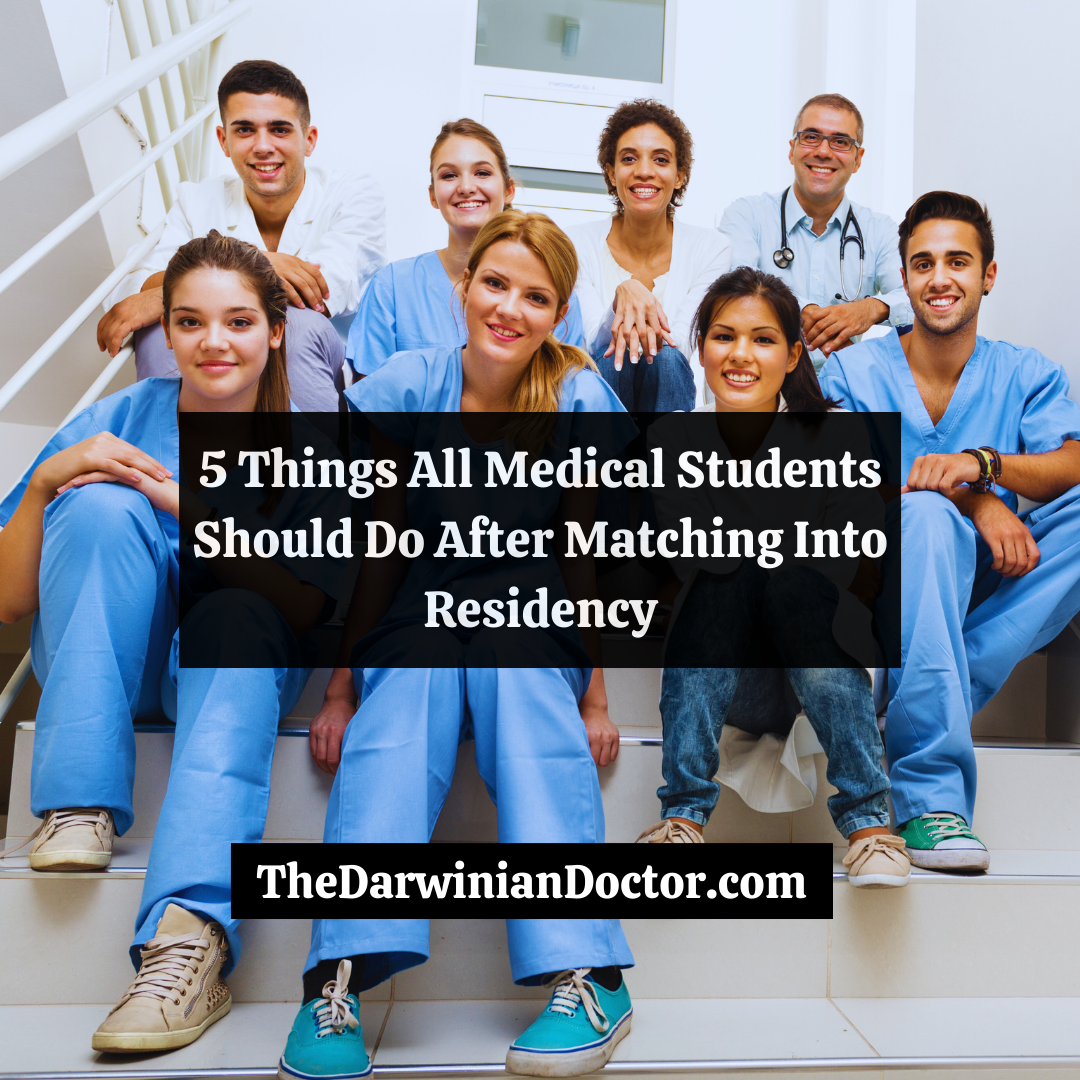Here are five things all medical students should do after matching into a residency program, from a physician 14 years post med school.

This post may contain affiliate links.
Introduction
Last week, over 20,000 fourth year medical students matched into residency programs. Even though my match was over a decade ago, I still remember it like it was yesterday. Since I applied to urology, I actually matched early, which was an amazing gift. Along with ophthalmology and the military match, urology applicants learn about their future residency program months earlier than their fellow medical students.
In theory, I had even longer to prepare for my cross-country move from Pittsburgh to Los Angeles. But in reality, I was really unprepared for my transition from medical student to physician. Looking back, there were a number of things that I wish I had done differently or better.
Drawing on my experience, here are five things all medical students should do after matching into residency:
- Carefully plan out your living arrangements
- Nail down your student loan strategy
- Focus on your friends and family
- Realize early that you’re an amazing person
- Start your education about personal finance and investing
Carefully plan out your living arrangements
While some residency programs are easier than others, you can expect to spend the vast majority of your waking hours in the hospital or clinic during residency. Because of that fact, you might think that it doesn’t matter where you live (but you’d be wrong).
I would argue that your living arrangements during residency are actually critically important. When you’re working so hard, your hours outside of work become even more precious. Your home will be your shelter from the storm and is essential to your recuperation.
Ideally, you want a home that is safe, comfortable, and affordable. You also don’t want it to be too far from your hospital (or hospitals). You’ll be driving back and forth from your home to the hospital thousands of times over the course of your residency. For those who will have the joy of “home call” (like urology and ENT), you might be making that drive a dozen times a day during a punishing call weekend. The last thing you want is a long commute during residency.
Read more: The Comedy of “Home Call”
I did my residency training in Los Angeles, so I knew that traffic was going to be a major factor for me. So I made sure to only live about ten miles from the hospital in an area called the “Miracle Mile.” This gave me about a 25 minute commute to work (outside of rush hour), which was about as good as you could ask for in LA. We were lucky enough to be in a position to buy our home, and it was almost perfect for our needs at the time.
So if you’re headed to a new city for residency, spend as much time as you can getting to know your new home. Scope out the city online and look at apartment or house listings to acquaint yourself with the cost of living. Make sure to test your commute from any location before signing a lease (or mortgage).
With enough planning, you’ll find the perfect sanctuary to be your refuge during residency training.
Nail down your student loan strategy
Despite the recent trend for medical schools to go tuition free, the vast majority of medical students are begin residency training with substantial student debt. Most will graduate with about $200,000 of debt, just like I did.
The decision about what to do with that debt is one of the most important financial decisions you’ll make in your early career as a doctor.
I tell my student loan saga in this post, but long story short, I used an income based repayment program in residency. Because my income was so low, my payments didn’t even cover the interest on the loans. This caused my student loans to balloon to $300,000 over the six years of my residency training.
In my last year of residency I realized that I wasn’t going to qualify for the Public Service Loan Forgiveness program, so I refinanced my student loans with First Republic at a 3.5% interest rate and started paying them off over a 15 year term. Now about 8 years later, I’m almost exactly at the 50% mark, with $150,665 left to go.
I tell you this story to impress upon you that decisions about your student loans are important and have far reaching consequences on your financial future. So before you start residency, it’s a golden opportunity to get your plan nailed down.
I don’t pretend to be an expert at student loans here at the Darwinian Doctor. I focus more on general personal finance and real estate. But if you’d like bespoke advice about your best student loan related options, I’d definitely recommend the services available at Student Loan Advice. They offer a relatively inexpensive consultation type service to help you choose the best path forward.
Focus on your friends and family
Now with some of the practical stuff out of the way, my next piece of advice is to spend the rest of fourth year focusing on friends and family. They often call the fourth year of medical school the “most expensive vacation you’ve ever taken.” That’s because after match, most medical students relax. I mean really relax.
Because after you match into a program, you’re on the home stretch. As long as you avoid any catastrophic honors infractions or brushes with law enforcement, you’re going to graduate medical school, become a doctor, and go to residency.
So take your newfound time and spend it cementing your relationships with your friends and family.
I still have great friends from medical school. Your classmates will be your only professional colleagues who knew you before you became a doctor. They were the ones who saw you in your pajamas in the library cramming for the exams and perhaps soaked in beer at the house party afterwards. Those types of friends become harder to come by as you leave school.
So think about your friends and decide which ones you’d like to keep after graduation. Make sure they know they’re special and cherish your time together.
If you’re in a relationship, engaged, or married, this is also the time to indulge your partner. Make sure they feel appreciated. Put some deposits into that emotional favor bank. Because once residency starts, it might be harder for them to feel the love when all they see is the tired and overworked resident.
Realize early that you’re an amazing person
This tip is personal.
Residency can be a very challenging experience. There are physical challenges, like staying awake on overnight call and assisting during long OR cases. But I would argue that the most challenging aspects are all mental.
For the first time, your knowledge (or lack thereof), can mean the difference between life or death for your patients. After the first few days of intern year, you’ll swiftly realize how much you don’t know.
For many, this can be mentally quite challenging. It can be even worse when your senior residents and attendings choose to tear you down, rather than support you.
Mental abuse is far too common in residency programs, as are its consequences: burnout, depression, and suicidal ideation. While not a panacea, a healthy self-perception can help.
So after you match into residency (but before you begin), make sure to become absolutely certain in your value and excellence. I’m not saying you should become arrogant or oblivious to constructive criticism. But you should realize that to even get into medical school and match into a residency program, you’re in an elite crowd. You have already proven yourself worthy.
Remind yourself of your excellence early and often to resist the extreme mental challenges that await in residency. When you do get torn down by your attending or your senior resident, just realize that their reprehensible behavior says a lot more about them than it does about you.
Start your education about personal finance and investing
Finally, it’s never too early to start learning about personal finance and investing. Once you graduate medical school, you’ll begin an incredible financial transformation. You will go from making a meager hourly wage for 3-7 years during residency to making hundreds of thousands of dollars a year.
The decisions you make regarding your spending, cost of living, and investing will set you on a path for either financial freedom or golden handcuffs.
Read more: Physicians are trapped by golden handcuffs
Personal finance is not hard. But it’s just like learning a new language. You need repeated exposure to start incorporating the terminology and concepts.
It’s also not too hard to master the basics of money management. To start, you just have to track your income and spending. Next, grow the gap between them so you have money left over each month. Finally, save an emergency fund and invest the rest into index funds. That’s 95% of the battle.
When you’re in a good financial position, you can consider higher risk/higher reward investments like real estate when you have more money.
You can read more about this here: How to Save, Invest, and Become Rich
But like all things, you’ll be at a tremendous advantage if you start early. So subscribe to a personal finance blog. Listen to some podcasts or watch some videos. Your future wealthy self will thank you!
Conclusion
Medical students all over the country have just matched into residency programs. Before you relax into the most expensive vacation you’ll ever take, consider this list to start residency off on the right foot.
Good luck with the rest of medical school. You’re going to be an amazing doctor!
— The Darwinian Doctor
Questions or comments? Make sure to leave them in the comment section below!
Make sure to subscribe to the email list so you never miss a post!
Experience the financial benefits of real estate without dealing with the headache!
Want to support the blog?
- Join our investor club at Cereus Real Estate
- Visit my Recommendations page
- Check out my wife’s food blog: Eat Dessert First
- Stay at our luxury short term rentals
- Check out my TikTok channel
- Follow me on Instagram
- Follow me on YouTube
- Contact me with questions


